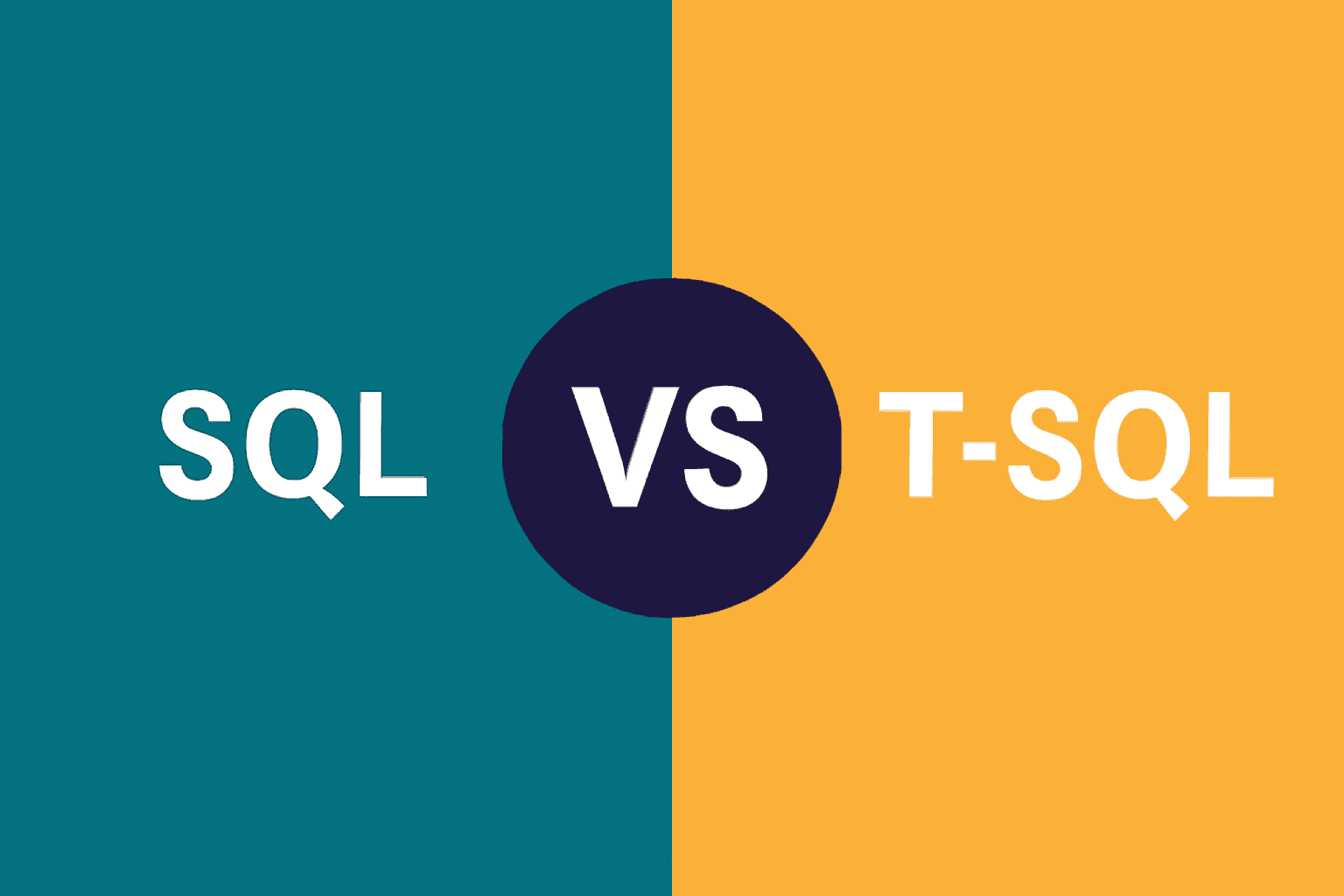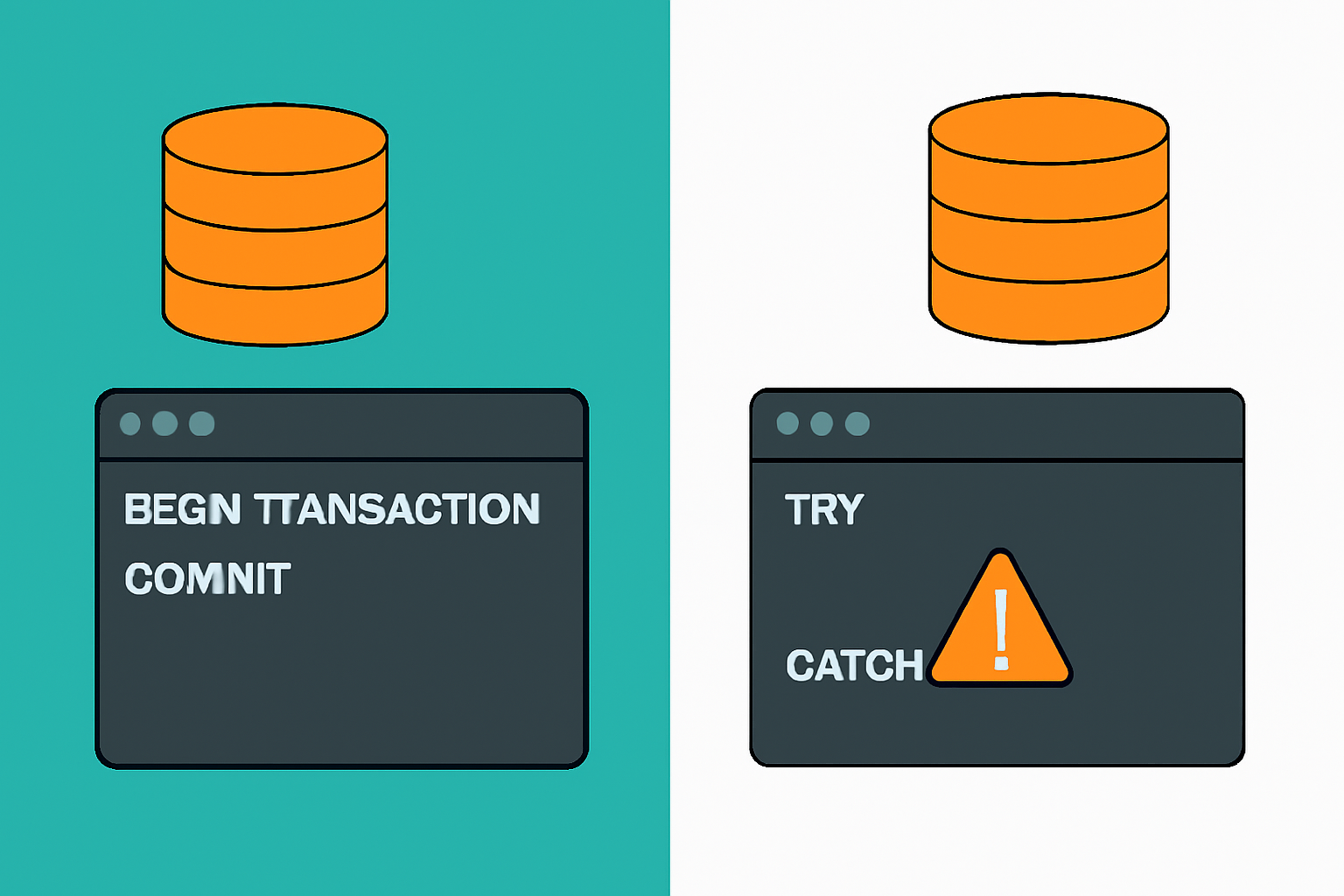-
Ideal for basic data queries and cross-platform compatibility.
-
Advanced features like stored procedures, error handling, and transaction control for Microsoft SQL Server.
SQL vs T-SQL: Key Differences and Which One to Choose in 2025

Your business is growing fast. As your database expands, you’re noticing performance issues, queries are slower, and data integrity is becoming harder to manage.
The pressure is on to scale efficiently and keep everything running smoothly.
Here’s the big question:
Should you stick with standard SQL for its simplicity and cross-platform compatibility?
Or, Do you need T-SQL’s advanced features to tackle more complex challenges?
In 2025, as data management systems become more complex, the right choice between SQL and T-SQL can make or break your database strategy. But with so many options, how do you know which one will best suit your growing business?
What Is SQL? And Why It’s a Reliable Choice
SQL, or Structured Query Language, is the industry standard language for managing relational databases.
It’s widely used across multiple database management systems or DBMS like MySQL, PostgreSQL, and Microsoft SQL Server.
SQL handles a variety of tasks like querying data, updating records, and managing database structures.
Here's why SQL is a staple in the world of data management:
- Simplicity: SQL is a declarative language, meaning you tell it what you want, and it handles the how. It’s closer to human language, which makes it easier to learn and implement.
- Cross-Platform Compatibility: Whether you’re working with MySQL, PostgreSQL, or SQL Server, SQL runs across multiple platforms without requiring specific customization.
- Data Integrity: SQL allows you to define constraints (e.g., primary keys, foreign keys) and triggers to ensure data consistency across your database.
SQL works best for managing structured data and is the default language for relational databases, ensuring it's simple, fast, and universally compatible.
For further reading, check out this detailed guide on SQL Overview from Microsoft Docs to understand the foundational role SQL plays across various systems.
What Is T-SQL? A Powerful Extension of SQL
T-SQL, or Transact-SQL, is a proprietary extension of SQL developed by Microsoft for use with its SQL Server database.
It enhances SQL by adding procedural programming features like stored procedures, loops, and error handling.
Here’s why T-SQL is crucial for enterprise-level applications:
- Stored Procedures: T-SQL supports stored procedures, which are precompiled SQL scripts. These can run with a single call, improving performance and reducing the need for repetitive code execution.
- Advanced Error Handling: T-SQL allows for sophisticated error management with TRY...CATCH, which is invaluable for keeping systems running smoothly by handling unexpected failures gracefully.
- Transaction Control: T-SQL offers transaction control with commands like BEGIN TRANSACTION, COMMIT, and ROLLBACK, ensuring that multiple operations happen atomically and consistently.
T-SQL is perfect for businesses heavily invested in Microsoft SQL Server and those that require advanced database operations, including complex business logic and error handling.
For more insights into T-SQL and its advanced features, take a look at the official Microsoft documentation.
SQL vs T-SQL: Key Differences at a Glance
|
Feature |
SQL |
T-SQL |
|
Platform |
Cross-platform (MySQL, PostgreSQL) |
Microsoft SQL Server only |
|
Procedural Features |
Basic queries |
Full control with stored procedures |
|
Error Handling |
None |
Advanced error handling (TRY...CATCH) |
|
Transaction Control |
Basic support |
Advanced transaction handling |
|
Use Case |
General database management |
Microsoft SQL Server-specific solutions |
When Should You Choose SQL or T-SQL?
So, how do you decide between SQL and T-SQL? Here’s a practical guide to help you choose based on your project needs:
- Choose SQL if:
- You’re working with multiple database platforms or need a universal solution that works across MySQL, PostgreSQL, and SQL Server.
- Your data manipulation needs are basic, focusing on queries, updates, and simple management tasks.
- You’re scaling across different environments and need portability.
- Choose T-SQL if:
- You’re working in a Microsoft SQL Server environment.
- You need advanced capabilities like procedural logic, error handling, or transaction control.
- Your database is complex, requiring custom workflows, business rules, and large-scale data manipulation.
SQL and T-SQL in Action at Mediusware
At Mediusware, we frequently help clients with enterprise-level solutions where data complexity is a major concern.
For example, one of our clients, a financial institution, required an efficient way to manage large volumes of transactions while ensuring high availability and data integrity.
For this project, SQL was used for basic data retrieval across multiple cloud platforms.
However, when the client’s needs grew, requiring custom transaction workflows and advanced error handling, we implemented T-SQL within their SQL Server environment to streamline processes and automate complex tasks.
By integrating T-SQL, we were able to improve efficiency, reduce manual errors, and ensure that the transaction management met the security standards required for financial data processing.
To learn more about how T-SQL is used in financial services, check out SQL Server for Financial Services.

Who Uses SQL & T-SQL?
SQL is used by virtually every organization that works with databases, from startups to global enterprises. It’s universal and trusted by businesses in all sectors.
On the other hand, T-SQL is predominantly used in industries like finance, healthcare, retail, and government.
These sectors rely heavily on Microsoft SQL Server to manage large datasets, implement complex business logic, and ensure security in their databases.
Make the Right Choice for Your Business
Choosing between SQL and T-SQL can significantly impact the performance, scalability, and maintainability of your database systems.
SQL is a universal, reliable choice for most projects, but T-SQL offers advanced features for those who need greater control and more complex database operations.
As data management challenges continue to evolve in 2025, understanding which language to use will be vital to keeping your systems efficient, secure, and future-ready.
Ready to optimize your database strategy? Whether you choose SQL or T-SQL, Mediusware’s experts are here to guide you in making the right choice for your business.
Contact us today to get started on the path to scalable database solutions!
